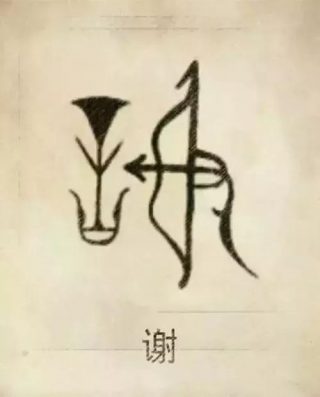The Xie(xiè) surname, a name deeply rooted in Chinese civilization, carries with it a rich history that spans thousands of years. Originating during the Western Zhou Dynasty, the Xie surname has witnessed the transformation and progress of Chinese society. From its beginnings as the name of a feudal fief to its current status as a cultural symbol, the evolution of the Xie surname reflects the unique charm of Chinese surname culture. The Xie surname is not just a family identifier; it is a vital vessel for the inheritance of Chinese civilization.

Ⅰ、Origins of the Xie Surname
The Xie surname has multiple origins, each contributing to its rich history:
1. Jiang surname branch:
The most widely accepted origin traces back to Shen Bo, a descendant of the Yan Emperor. During the Western Zhou Dynasty, Shen Bo was granted the fief of Xie (located in present-day Tanghe, Nanyang, Henan) for his merits. His descendants adopted the name of the fief, forming the Henan Xie clan.
2. Ren surname Branch:
Another branch originates from the descendants of the Yellow Emperor, who established the state of Xie (in present-day Tanghe, Henan). After the state was conquered by King Xuan of Zhou, its people took the name of their former state as their surname.
3. Minority groups changing surnames:
During the Northern and Southern Dynasties, some members of the Xianbei ethnic group, such as the Zhile clan, adopted the Xie surname as part of their sinicization. Similar cases occurred among Mongolian and Manchu groups.
Ⅱ、Historical Figures of the Xie Surname
The Xie surname has produced numerous notable figures across politics, military, and literature:
Xie An of the Eastern Jin Dynasty: Famous for the phrase "Dongshan Revisited," Xie An led the Jin forces to victory at the Battle of Fei River against the Former Qin, securing the Eastern Jin's stability for a century.
Military Strategist Xie Xuan: Nephew of Xie An, Xie Xuan commanded the frontline at the Battle of Fei River and established the elite "Beifu Army," which turned the tide of the war.
Xie Lingyun, Pioneer of Landscape Poetry: A literary figure of the Southern Dynasties, Xie Lingyun is credited with founding the landscape poetry tradition. His famous line, "Spring grass grows by the pond," has influenced generations of poets.
Xie Tiao: A member of the "Jingling Eight Friends," Xie Tiao's poetic style influenced later giants like Li Bai and Du Fu of the Tang Dynasty.
Xie Yiwu of the Han Dynasty: Known for his talent-spotting abilities, Xie Yiwu recommended the famous historian Ban Gu for official service, earning praise as a "sixth turtle of the state" (a metaphor for wisdom).
Ⅲ、Cultural Significance
1.Ancestral Halls and Clan Names:
Junwang (Regional Prestige): The Xie surname is closely associated with Chenjun (modern Huaiyang, Henan) and Kuaiji (modern Shaoxing, Zhejiang), representing its early political and cultural centers.
Tanghao (Clan Hall Names): The "Baoshu Hall" derives from Emperor Xiaowu of Jin's praise of the cypress tree in Xie An's courtyard, while the "Dongshan Hall" commemorates Xie An's retreat to Dongshan.
2.Family Teachings and Values:
The Xie clan emphasizes "filial piety as the foundation and poetry as the传承." The Xie Clan Genealogy stresses the importance of honoring parents and maintaining an independent spirit, balancing public service with personal integrity.
3.Literary Contributions:
From Xie Lingyun's landscape poetry to Xie Fangde's Wenzhang Guifan (Models of Writing), Xie literati have shaped Chinese aesthetic traditions. Xie He's "Six Principles of Painting" remains a cornerstone of Chinese art theory.
Ⅳ、Social Impact
1.Migration and Distribution:
The Xie surname spread southward during the Spring and Autumn period, reaching Fujian and Guangdong by the Tang and Song Dynasties. During the Ming Dynasty, Xie descendants migrated to Taiwan. Today, over 10 million people bear the Xie surname worldwide, with major concentrations in Guangdong, Hunan, and Sichuan. Overseas, the Xie surname is most prevalent in Southeast Asia.
2.Political and Military Influence:
During the Six Dynasties period, the Chenjun Xie clan, alongside the Langya Wang clan, dominated the aristocratic politics of the Eastern Jin. The Xie An family maintained prominence for seven generations, controlling military and political power for nearly 200 years.
3.Modern Influence:
The Xie surname ranks as the 23rd most common among Chinese surnames globally, with over 10 million bearers. Overseas Chinese communities, particularly in Southeast Asia, have preserved Xie cultural heritage through ancestral halls in places like Meizhou (Guangdong) and Changle (Fujian).
Ⅴ、Conclusion
The history of the Xie surname is a microcosm of Chinese civilization's development. From its roots in the Yan and Yellow Emperors to its prominence as a model of aristocratic culture, the Xie clan has played a significant role in shaping Chinese history. The "Baoshu Family Values," embodying a spirit of progress and cultural awareness, remain a vital subject in the study of Chinese surname culture.